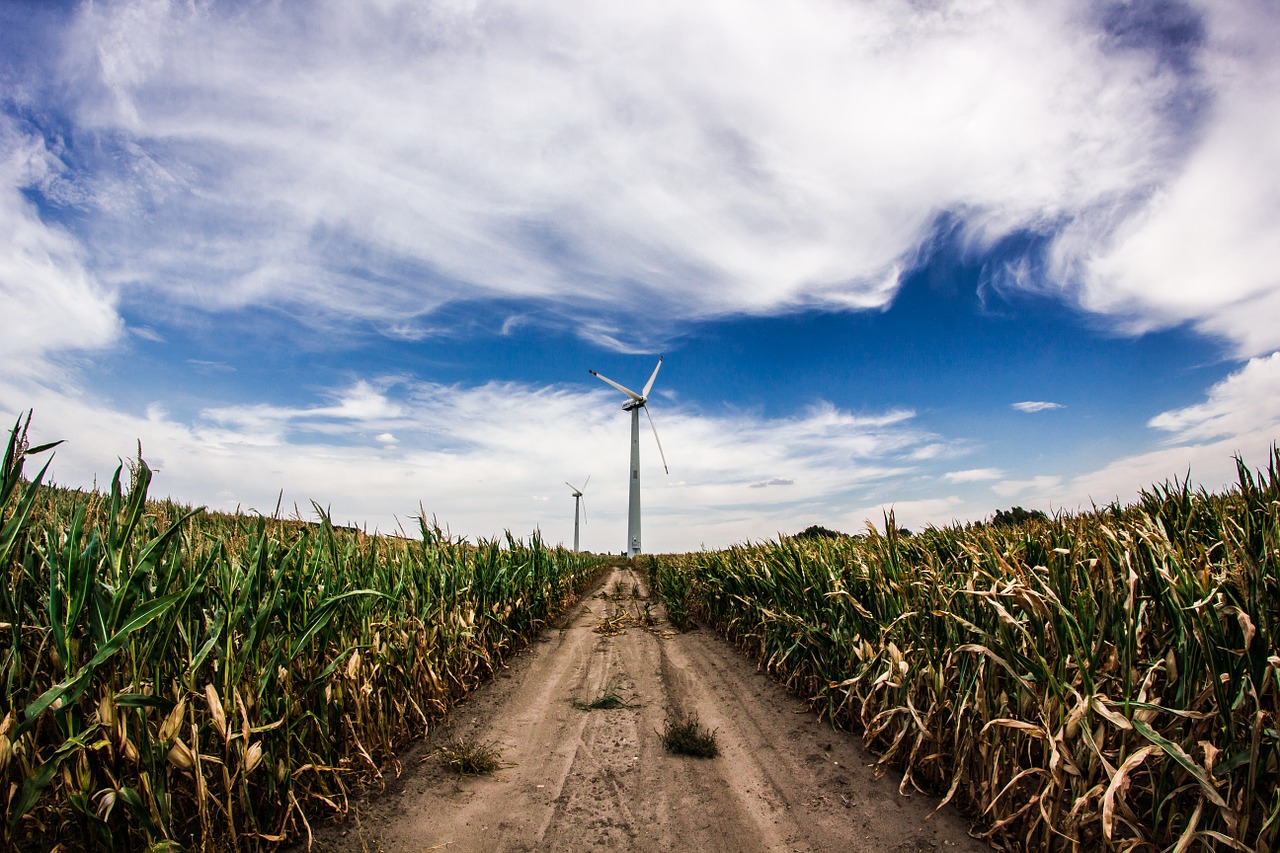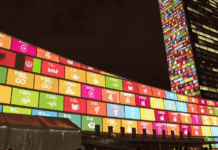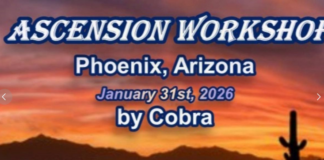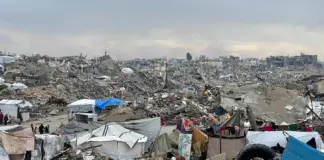By Michael Snyder,
The information that I am about to share with you is extremely alarming, but I have always endeavored to never sugarcoat things for my readers. Right now, there are shortages of certain items in grocery stores across the United States, and food supplies have gotten very tight all over the globe. I have repeatedly warned that this is just the beginning, but I didn’t realize how dire things have already gotten until I received an email from a farming insider that I have corresponded with over the years. I asked him if I could publicly share some of the information that he was sharing with me, and he said that would be okay as long as I kept his name out of it.
According to this farming insider, dramatically increased costs for fertilizer will make it impossible for many farmers to profitably plant corn this year. The following is an excerpt from an email that he recently sent me…
“Things for 2022 are interesting (and scary). Input costs for things like fertilizer, liquid nitrogen and seeds are like triple and quadruple the old prices. It will not be profitable to plant this year. Let me repeat, the economics will NOT work. Our plan, is to drop about 700 acres of corn off and convert to soybeans (they use less fertilizer, and we also have chicken manure from that operation). Guess what? We are not the only ones with those plans. Already there is a shortage of soybean seeds, so we will see how that will work out. The way I see it, there will be a major grain shortage later in the year, especially with corn. I mean, we are small with that. What about these people in the midwest who have like 10,000 acres of corn? This will not be good.”
Once I received that message, I wrote him back with some questions that I had.
In response, he expanded on his comments in a subsequent email…
As for the farming, I see it getting bad. Things like fertilizer and liquid nitrogen have tripled and quadrupled in price. Yes commodity prices are up, but that certainly wont cover the new increased input costs. We are in NC, so while certainly not like the midwest, we still grow grain. The midwest of course will have these same higher input costs as well.Corn for example, typically takes about 600 pounds of fertilizer per acre, plus 50 gallons of liquid nitrogen. Times that by many acres and thats a lot of money. Soybeans take much less. The plan for us, and most others around here, is to drastically cut corn acres and switch to soybeans. Problem is, there is apparently a soybean seed shortage because others have this plan as well. We were lucky enough to pre buy enough to do it. However, most people, especially younger farmers, or farmers where that is all they do, probably don’t have the money to front like that.The way I see it, a corn shortage will come. I guess there could possibly be a glut of soybeans, but remember that could depend on the seed being available. I guess there are other alternatives, maybe milo, oats, or barley. Of course the corn market is much larger. Think animal feed and ethanol. I mean for animals, soybeans are used too, but its a mix. What happens to the animal producers who depend on reasonably priced corn? I just don’t see how it can end well. I mean, even if we end up with plenty of soybeans, even a glut, then you have a busted market for that. I don’t know. There just isnt much history to base any of this on. I just see it hurting both grain farmers, and animal farmers, and also translating to more shortages and price increases for consumers who buy the end products.
I was stunned when I first read that.
Corn is one of the foundational pillars of our food supply.
If you go to the grocery store and start reading through the ingredients of various products, you will quickly discover that corn is in just about everything in one form or another.
So what is our country going to look like if a severe corn shortage actually happens?
I don’t even want to think about that.
Of course fertilizer prices are not just going through the roof here in the United States.
In South America, high fertilizer prices are going to dramatically affect coffee production…
Christina Ribeiro do Valle, who comes from a long line of coffee growers in Brazil, is this year paying three times what she paid last year for the fertilizer she needs. Coupled with a recent drought that hit her crop hard, it means Ms. do Valle, 75, will produce a fraction of her Ribeiro do Valle brand of coffee, some of which is exported.
There is also a shortage of fertilizer. “This year, you pay, then put your name on a waiting list, and the supplier delivers it when he has it,” she said.
If you love to drink coffee in the morning, you will soon be paying much more for that privilege.
Over in Africa, fertilizer prices could result in “30 million metric tons less food produced”…
Fertilizer demand in sub-Saharan Africa could fall 30% in 2022, according to the International Fertilizer Development Center, a global nonprofit organization. That would translate to 30 million metric tons less food produced, which the center says is equivalent to the food needs of 100 million people.
“Lower fertilizer use will inevitably weigh on food production and quality, affecting food availability, rural incomes and the livelihoods of the poor,” said Josef Schmidhuber, deputy director of the United Nations Food and Agriculture Organization’s trade and markets division.
Where in the world are we going to get enough food to replace “the food needs of 100 million people”?
This is beyond serious.
Basically, the stage is being set for the sort of historic global crisis that I have been relentlessly warning about.
Many Americans had assumed that even if the rest of the world was suffering that we would be immune.
But now there are widespread shortages all over the nation, and the Wall Street Journal just published a major article entitled “U.S. Food Supply Is Under Pressure, From Plants To Store Shelves”.
This is really happening.
In Washington D.C., residents are being instructed to “just buy what you need and leave some for others”…
“If you’re hitting the grocery store to prepare for winter weather, please just buy what you need and leave some for others! You may have noticed empty shelves in some stores due to national supply chain issues, but there is no need to buy more than you normally would.”
What would have been unimaginable just a few years ago is now making headlines on a daily basis.
Of course it isn’t just our food supply that is under threat. As Victor Davis Hansen has aptly noted, our country is now in the process of undergoing a “systems collapse”…
In modern times, as in ancient Rome, several nations have suffered a “systems collapse.” The term describes the sudden inability of once-prosperous populations to continue with what had ensured the good life as they knew it.
Abruptly, the population cannot buy, or even find, once plentiful necessities. They feel their streets are unsafe. Laws go unenforced or are enforced inequitably. Every day things stop working. The government turns from reliable to capricious if not hostile.
A lot of people are going to be caught off guard by the pace of change.
Things are shifting so rapidly that it really is hard to keep up with it all unless you are paying very close attention.
Now that you have been exposed to the information in this article, please don’t go back to sleep.
This is not a drill.
We really are heading into a nightmare scenario, and I strongly urge you to act accordingly.
Source: http://endoftheamericandream.com
Disclaimer: We at Prepare for Change (PFC) bring you information that is not offered by the mainstream news, and therefore may seem controversial. The opinions, views, statements, and/or information we present are not necessarily promoted, endorsed, espoused, or agreed to by Prepare for Change, its leadership Council, members, those who work with PFC, or those who read its content. However, they are hopefully provocative. Please use discernment! Use logical thinking, your own intuition and your own connection with Source, Spirit and Natural Laws to help you determine what is true and what is not. By sharing information and seeding dialogue, it is our goal to raise consciousness and awareness of higher truths to free us from enslavement of the matrix in this material realm.
 EN
EN FR
FR



























Corn and Soy shortages
I for one would rejoice, IF so many didnt rely on it to sustain themselves.
All our Carb-iterian friends will starve
Our SoyVegans friends will also starve
I am neither but are actively growing flat trays of greens and buttercrunch lettuce indoors under simple lights
Start seeds now, even if you only have a balcony, its possible.
Get with neighbors and pool resources and share the food you grow.
So many ways to supplement food
I belong to a local CSA program, we even get boxes in winter because everything is grown in greenhouses.
I have raw milk shares, I pick up 2 gallons a week
I make kefir and cheese
I realize not everyone can do this but get creative
Check a site called Local Harvest for farms in your area.
I raise my own hens and have alot of eggs
This is how we survive a food shortage
Get veggies now and ferment them, almost everything can be preserved by fermenting or culturing it.
Think like your Grandma 😉
Here's a video called "Licence to farm" with views of a variety of people on GMO technology: https://youtu.be/eJnAV_quG6Y
Here are 2 short videos with reports from South American farming communes that are in trying times due to losing their traditional farming culture. In Spanish with German subtitles:
4. Videobotschaft Teofilio Sosa (Deutsche untertitel) on Vimeo
2. Berichte Pestizideinsatze Mcal Lopez (Deutsche untertitel) on Vimeo
In the US farmers are paid to stop farming:
https://www.youtube.com/watch?v=xJ0Vb5BAJGE
Jeffrey Smith https://youtu.be/PbD4lddYXok
Jeffrey Smith wrote a book titled "Seeds of Deception".
It's about GMO technology and its effect on the natural world, including our health.
The article contains a shortsighted opinion, and the view expressed isn"t realistic, when looking through the eyes of organic farmers, and indigenous tribes.
I do know that the views of American farmers on the present scale of farming have their roots in a survival mode. Machinery, and technology is owned by the bank, the farmer has become a slave on his own farm, paying off investments until his last day on our planet. That position is unnatural to a propr farmer's nature.
Underneath the present conditions of agriculture in the US are decades of damage to soil, seed, and methods of harvesting.
Round Up is killing all life in soil and surface life of nature on and around the fields.Think about wildlife, like the birds, rabbits, mice, butterflies, bees, etc They can't feed themselves, you see? Agriculture needs a radical reformation and status, I believe.
The disaster that is foreseen in this article may be the push to begin tp turn the tidal wave of Agenda 21 and a New World Order.
Same as with the pandemic, collective blinders are limiting the view on the larger picture.
When we, as a collective, don't use our minds in sync with our hearts and guts, life itself will show us a mirror so large, that we can't ignore our own doing in all of this.
RoundUp is sprayed on the wheat after harvesting, and in the first year this was done, a gluten- allergy appeared in consumers, worldwide.
Glyphosates cause trouble in paradise. Years ago a farmer has won a courtcase where Monsanto was forced to pay compensation for his cancer, caused by the use of RoundUp. On YouTube you will find that case.
In that courtcase, RoundUp was found dangerous to human health, and production plus use of it was forbidden. It showed up under a new name, and now it's allowed again. As long as a consumer wants a product, the producer delivers, isn't it?
As a former organic caterer, nutritionist and gardener, with practical experience in market- gardens, and on the land of many organic farms, I'm keeping an eye on agricultural development.
In The Netherlands, glasshouse farming is intense, and open farmland is in decline. Mais is growing for cattle in barns, many meadows are empty. The farmer holds more cows for the milk production, than he has space for on the land.
Every square meter has a limited use per number of cows. It's ridiculous, how also here farming is ruled by the government. Many farmers become landlords, allowing holiday makers to camp on his land, create a mini-zoo with farm animals, or they start a farmshop in a barn. Just to make a living.
Many farmers have stopped farming in our country. Generations of farmer-families lived in the same farm, that's now turned in a luxurious 2nd home for wealthy people.
Despite the loss of agriculture, and the varity of crops, there's a growing number of organic farms, fortunately. Not all is lost, The lists of canidates, waiting for an allotment, grow long, for many of us have a wish to start such a garden for food supply, and love for spending more time in nature.
Many Dutchies have invested in their garden, since lockdowns kept them 'grounded".
In troubled times we're pushed with our noses on what truly matters in life, I believe. It depends on how many will act on that realization, how and when a change for the better shows up. Nature teaches me patience.
I'm a little puzzled by the word "corn" for it seems that wheat is meant by it. I know the name corn as mais.
Fortunately organic valleys still exist in this nation, not all farmers are corporate slaves thank god.
I live in a small organic farming community and I bought shares in some local farms.
I pick up food weekly
Raw milk and boxes of seasonal vegetables
I also buy local beef and yak raised here on strictly grass.
I know the yak rancher personally and the animals are so loved and cared for while being raised up.
Bio dynamic farming principles as Rudolf Steiner spoke of are also used here.
Heritage breed animals are being raised, like the American Kun Kun pig and the Milk cows are Heritage breeds too Brown Swiss cows and Guernsey.
Its a wonderful place with no 5G and lame 4G but it makes me love it even more!
Jair Messias Bolsonaro presidente Brasil já antecipando estes problemas pediu ao exercito que comece a produção de insumos agrícolas, e todos deveriam fazer isto o mais breve possível pois nosso grande erro foi por o controle sobre praticamente tudo nas mãos do PCC Chinês chegou o momento de sermos autossuficientes em insumos e alimentos, no caso do Brasil já somos autossuficientes em alimentos só nos resta nos insumos e creio que em breve agradecendo ao nosso presidente seremos.
Jair Messias Bolsonaro, president Brazil, already anticipating these problems, asked the army to start the production of agricultural inputs, and everyone should do this as soon as possible because our big mistake was to put control over practically everything in the hands of the Chinese CCP, the time has come for us to be self-sufficient in inputs and food, in the case of Brazil we are already self-sufficient in food, we only have inputs and I believe that soon, thanking our president, we will be.
It's actually great to hear corn will no longer be planted. It is a toxic, GMO crop requiring an alarming 600 lbs. of chemical fertilizer per acre! Corn destroys the human gut and is the source of many cases of permeable bowel syndrome, aka Leaky Gut, leading to autoimmune diseases. Humanity, and all our animals, will be much better off without toxic, gmo corn.
What happened to the traditional maize varieties then?
Aqui no Brasil os pequenos agricultores guardam as sementes "Crioulas" e por vezes trocam entre si isso vai de milho, alho, feijão etc. etc. etc.
Here in Brazil, small farmers keep the seeds "as" and sometimes exchange it with each other, such as corn, garlic, beans, etc. etc. etc.
Not just corn but modern wheat too
Personally I dont consume corn wheat or soy.
I also do not consume animals that consume it either.
Modern wheat has been so hybridized to increase yield that the gluten is Huge in it.
Traditional wheat like Einkorn is very small and very nutritious
I bake with Einkorn alot
rarely ever eat corn products anymore
We dont buy any corporate food anymore, none.
and its been like this for years